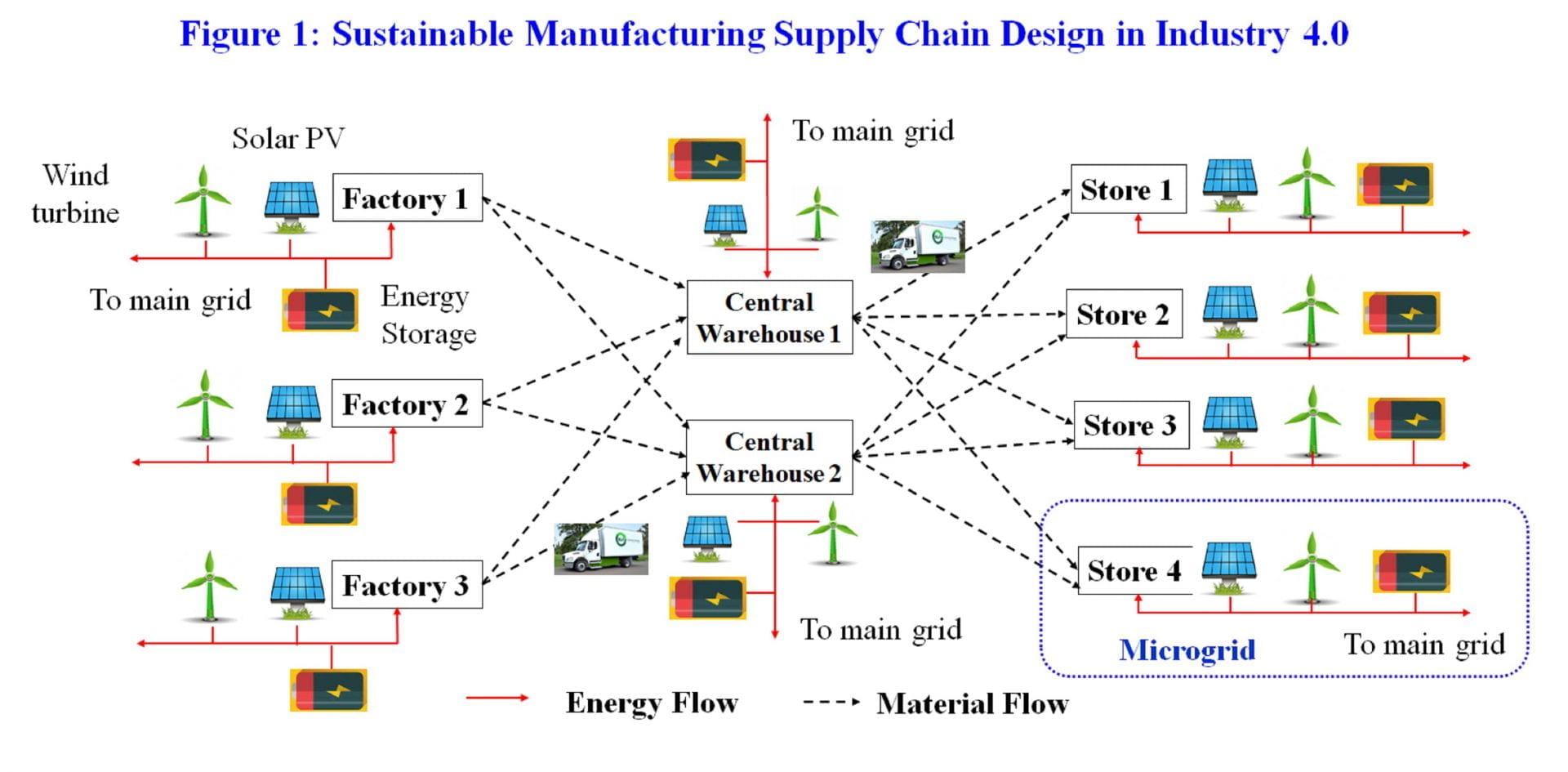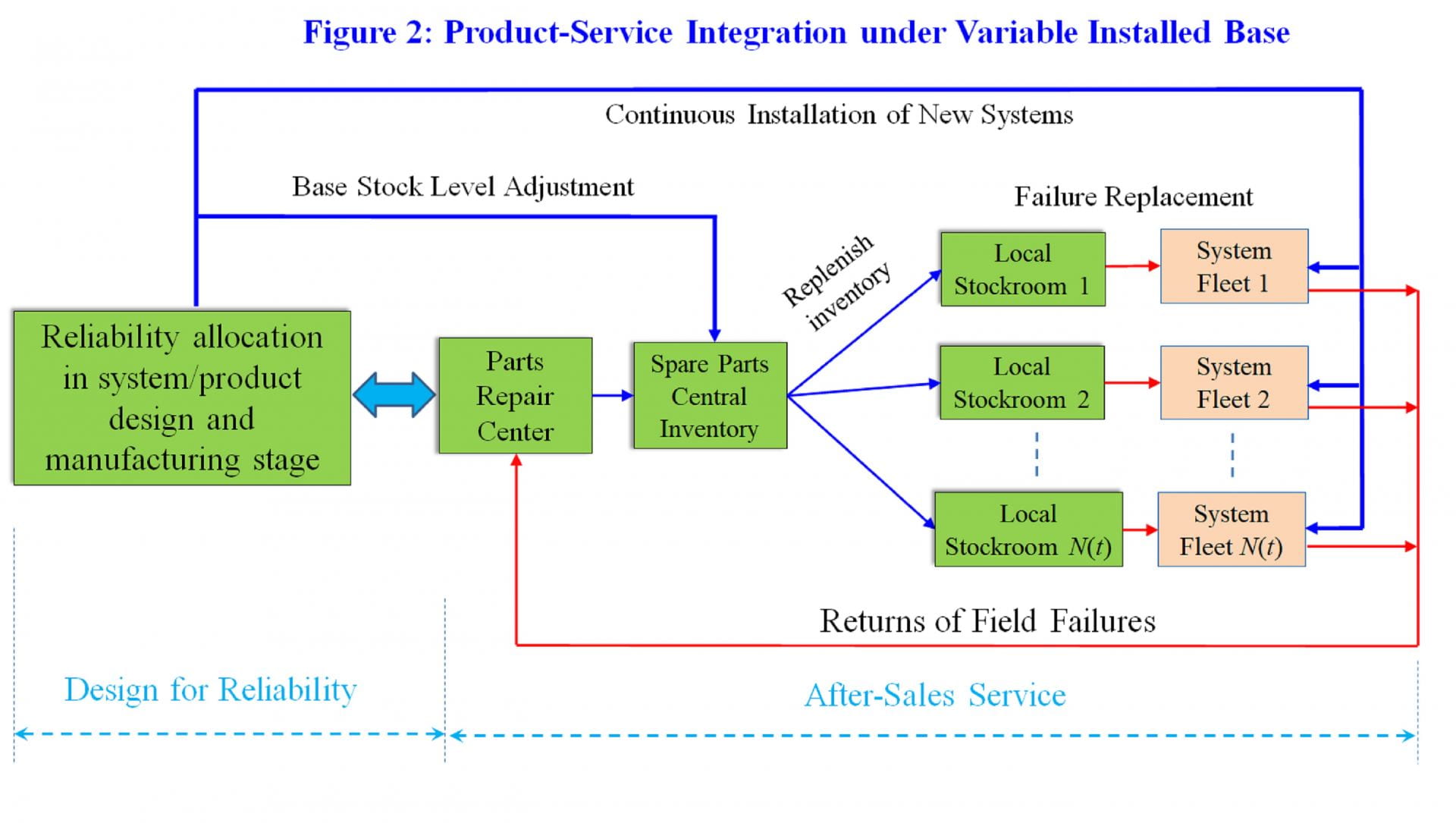1. Overview
Our research projects are cross-disciplinary and reside at the interface of operations management, systems engineering, and environmental sustainability. The current efforts focus on two themes: I) modeling and design of sustainable manufacturing and supply chains in distributed energy realm; and II) product-service integration for new product introduction under variable installed base.
2. Design of Sustainable Manufacturing Supply Chain
Manufacturing industries account for one-third of the carbon emissions in the world. Our research strives to attain sustainable industrial operations through the integration of wind and solar energy in production and logistics infrastructures. Figure 1 shows a smart manufacturing supply chain in Industry 4.0 where factories, warehouses (or distribution centers), stores and electric trucks are all powered by onsite microgrids comprised of wind turbines, photovoltaics and batteries. Power intermittency, upfront capital cost, and utility regulations are among the main challenges in deploying large-scale onsite generation. The goal of our study is to integrate variable generation technologies to achieve low-cost, eco-friendly operations with ensured power reliability and quality. Machine learning algorithms and multi-stage stochastic optimization are employed to perform wind and weather forecasting, microgrid sizing and siting, and production planning, respectively. This research represents a first-of-its-kind to incorporate transactive energy in the design of multi-echelon supply chain networks with the synergy of commodity and energy markets. The novelty of this study is to expand existing supply chain operation domain by bringing transactive energy or prosumer renewables as a new feature along with materials, information and cash flows.

3. Product-Service Integration considering Variable Installed Base
In capital goods industry, system reliability, maintenance, and spare parts logistics play a key role to sustain the operational availability of field equipment. These systems include airplanes, automobiles, high-speed rail, manufacturing machinery, healthcare equipment, and defense systems, among others. However, existing studies often handle this problem separately. For instance, reliability-redundancy allocation concentrates on the product design and manufacturing phase, while spare parts inventory models focus on the maintenance and repair in after-sales market.
Our research aims to develop a holistic framework where reliability, redundancy, maintenance, and spares inventory are jointly coordinated over the product lifetime. During the new product introduction, product installed base (i.e., fleet size) keeps growing due to market expansion. Hence the spare parts demand turns out to be a non-stationary process with time-varying mean or variance, which further complicates the management of the product-service integration. The preliminary findings have been recognized by IEEE Reliability Society, American Society for Quality, and INFORMS with several best paper awards. The research findings are also incorporated into our new book “Reliability Engineering and Services” published by Wiley in March 2019. Figure 2 depicts the working principle of the integrated product-service management framework.

4. Funded Projects:
- “Sizing Renewable Microgrid for Net-Zero and Resilient Electric Vehicle Charging Stations of Texas through 2040,” sponsor: Electric Power Research Institute (EPRI), 11/2023-12/2024,
- “Profits or Loss: Installing Electric Vehicles’ Chargers on Public Parking Spots,” Sponsor: The ORSP Office of Texas State University, 1/2023-12/2023, PI is Emily Zhu.
- “Advanced Potable Water Reuse Integrating with Renewal Energy: A Machine Learning Approach for San Marcos”, sponsor: Texas State University, 6/2021-5/2022., Co-PI are Dr. Emily Zhu, and Dr. Keisuke Ikehata.
- “ME-GREEN: Manufacturing for Environment by Generating Renewable Energy in Enterprise Networks,” Sponsor: National Science Foundation (NSF), award # 1704933, Co-PI: Dr. Clara Novoa, from 7/2017 to 6/2021.
- “BGREEN-Building a Regional Energy and Educational Network,” sponsor: U.S. Department of Agriculture, Texas State University, from 9/1/2015 to 8/31/2016 (Extention).
- “BGREEN-Building a Regional Energy and Educational Network,” sponsor: U.S. Department of Agriculture, award # 2011-38422-30803, from 9/1/2011 to 8/31/2015, other consortium PIs include Dr. Heidi Taboada from UT- El Paso, Dr. Delia Valles-Rosales from NMSU, and Dr. Shad Nelson from TAM-Kingsville. Two Co-PI at Texas State U are Dr. Reed Richardson and Dr. Jesus Jimenez at Texas State U.
- “Developing High School Students’ Curiosity in Science and Technology in Capstone Design Days,” sponsor: Halliburton Foundation, award # 3200006937, project from 9/1/2014 to 5/31/2015. Co-PIs are Drs. H. Stern, S. Aslan, B. Asiabanpour, J. Tate, J. Jimenez, C. Novoa, A. Qasem, F. Méndez, and Ms. S. Romanella.
- “MSEIP: Creating Virtual Teaching Assistants to Improve Math, Engineering, and Physics Curriculums,” sponsor: U.S. Department of Education, award #: P120A100020, 10/1/2010-9/30/2013.
- “Designing a Network-Based Metering System for Smart Grid Technologies,” sponsor: Research Enhancement Program, Texas State University, 1/1/2011-12/31/2011., Co-PI is Dr. Stan McClellan.
- “MRI: Acquisition of a Low-Field NMR for Research/Education at Texas A&M International University (TAMIU),” NSF (#0820919), 9/1/2008-8/31/2011, PI is Dr. Q. Ni at TAMIU.
